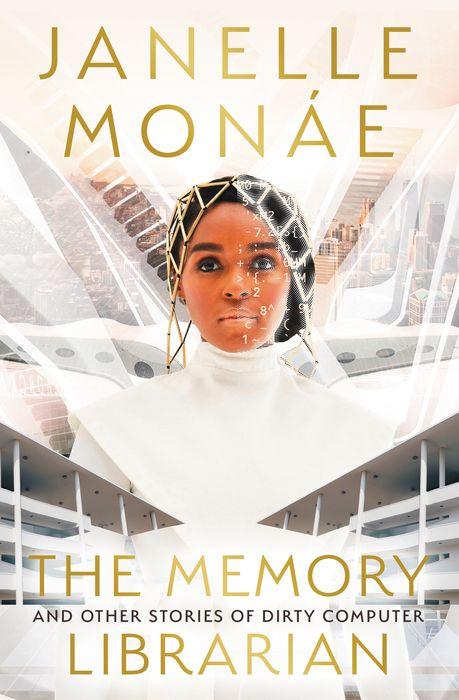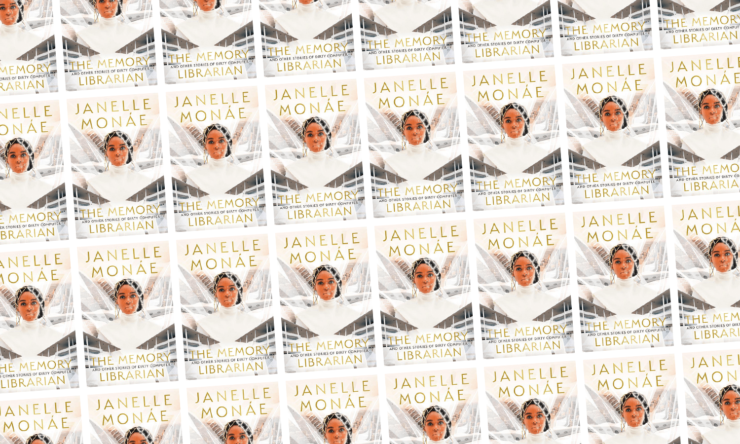Everything Janelle Monae has created, so far, been vibrant, authentic, electric. Whether it is her own special blend of pop, funk, hip hop music, or her roles in films, or television, or even production, she has always maintained a highly individual, unique and intelligent take on storytelling, and one that has consistently been inclusive of, and respectful of, other talents in her orbit. Now, with her first book, the short story collection The Memory Librarian & Other Stories of Dirty Computer, she proves that she can continue being just as electric with the written word, even when it’s not set to a beat. (Except it nearly always is.)
It’s unfair to talk about Monae’s stories without the context of the other forms of art she creates. All her Dirty Computer narratives from 2018, be they songs or music videos or shorts, stem from the same premise of a world controlled by a totalitarian state, New Dawn, where any one who does not conform to state’s idea of acceptable is considered a deviant, a ‘dirty computer’ that needs a hard reset.
These 5 stories are each a collaborative work, with Monae pairing up with writers Alaya Dawn Johnson, Danny Lore, Eve L. Ewing, Yohanca Delgado and Sheree Renee Thomas, all of whom are published writers of genre fiction. At the crux of each story is the experience of marginalised (and in New Dawn, forcibly criminalised) young, black or brown, queer women or non binary people. Trying to exist within a ‘new breed of techno-nationalist’ systems, they are forced to shroud their true selves, only allowing themselves to ‘burn when or where [our] light could shine solely before trusted, beloved eyes.’ If found out, they are wiped clean of their memories and identity and are forced to fit into standardised roles that New Dawn finds acceptable and easier to control. With every mind wipe of course comes the erasure of personal and ancestral history, too, which means that it ‘would have been only a matter of time before [they can] no longer remember a way into [their] futures.’
There is, as may be obvious from the collection’s title, a strong focus on memory in these stories, on what it means to remember who you are, where and who you come from, but also to make new memories to grow onwards from, better ones to pass along to future generations. Experiences and memories of belonging and freedom, that encourage the creative growth needed to imagine a better future.
Buy the Book


The Memory Librarian
Monae, like her mentor Prince (whose concepts can be heard both in the synth grooves of her Dirty Computer album as well as in these stories), has always enjoyed creating performance avatars or alter egos for herself. She was Cindy Mayweather, an android sent from the future, in the Metropolis concept albums series. With 2018’s Dirty Computer and accompanying ‘emotion picture’ short film of the same name, she was Jane 57821, a woman who escapes New Dawn’s tyrannic regime with her identity (and memory) still intact.
But before we meet Jane in The Memory Librarian, we meet the rare black queer woman who has risen up into the highest echelons of New Dawn, the Director Librarian of the first titular story. Seshet has worked her way to the top to now manage the memories of Little Delta’s citizens; keeping order by wiping deviants, storing their memories and erasing them when she needs to. What does it mean for her, to be lonely and wanting love, while also having the power to access the secrets of every person around her, to even be able to manipulate them—and her own? How does she feel when the system she is a part of turns against people like her? How will she reconcile herself to the huge discrepancies between who she is, who and what she wants and the regime she answers to? Because under the surface of all that control, there is ‘a blooming …part rebellion and riot, part expression repressed.’
In Timebox, we meet a pair of young women from very different backgrounds who move into an apartment with a room that is set out of time—literally. The room allows you to spend a much time in it as you need, yet when you emerge, you will find the world to be exactly where you left it. The possibilities of having an endless pocket of time outside of reality are mind boggling—how much more could you achieve, if you weren’t always racing against the clock, always trying to do more to prove that you were as worthy as those you didn’t look like?
Monae and her collaborators know how exhausting it is to constantly be hustling in a world that only pays attention to a certain sort of person—the sort you’re not. It is exhausting to be constantly fighting against white supremacy, against racism, sexism, bigotry of every sort on the daily—how then, do we expect people of colour, people who identify as queer or non binary to have the bandwidth, the capacity, the time to do more, like create art or create better futures freely? If all your time is spent proving you are worthy enough, where do you find the time to be more? And if you had that sudden magic, would you share it with others? Who decides who is worthy of that? There are no right or wrong answers, ever. Just possibilities, conversations.
For a reader familiar with Monae’s musical oeuvre, there will be clear connections to both the Dirty Computer album and videos, and the accompanying emotion picture. We meet the lead characters of the emotion picture, Jane, Zen and Che, in the second story Nevermind. Jane is living at the Pynk hotel, a desert commune that is a safe haven for anyone who identifies as a woman, until it’s not. Current and direct, the story asks why there must be a limit to the identities feminism will embrace. There shouldn’t, of course, there is no doubt of that here, only acknowledgment that unfortunately, some will insist there are.
This hotel is the same space featured in Monae’s video for the song Pynk. There are so many fun connections to her music and musical influences in these stories, and most are not that hard to find: Nevermind is the drug used to wipe peoples minds, and is also the name one of Prince’s alter egos; the story Save Changes, in which a young woman must decide when it is worth risking turning back time, features a secret party that is raided by the authorities, and echoes scenes from the music video for Screwed, as well as that for Crazy, Classic, Life.
It’s in that song that Monae things ‘I am not American’s nightmare/I am the American cool/ Just let me live my life’. The stories in Memory Librarian stem directly from Monae’s concerns for the lives of people most like her—queer, non binary, black, brown, creative free thinkers who have been held back by systemic racism: anyone who has been othered by a homophobic, sexist and bigoted world that will not allow true expression and pure unfiltered creativity to flow unfettered. People who do not fit, and live out possibilities, make choices other than the ones an authoritative state can control, will always make the state nervous. The characters in this book are a glorious representation and celebration of a spectrum of sexuality and gender, each written with pure empathy and not a whiff of tokenism. You wouldn’t say any of the metaphors are subtle, but then why should they be? Monae has always been unabashedly direct in every form of storytelling.
While the stories may be set in a high tech dystopia, Monae and her collaborators don’t envision a future that is entirely all doom and despair.Timebox Alter(ed) is a lovely, hopeful finale to the collection, a story in which a group of children discover just how much power lies in their artistic imaginations, when they are told ‘you can’t build a future if you don’t dream it’.Each of them can envision a positive, thriving future not just for themselves but for others too, where there are ‘people of all identities, nations, and ages, looking happy, sheltered, well fed, remembered. It was a marvellous thing to be seen, truly seen, and not walked over or peered through as if you did not exist, as if you should not exist.’
Admittedly, some questions do remain, most to do with the larger worldbuilding of New Dawn, with little clarity offered as to who really runs the world, what is their ultimate agenda besides gaining power, and how does the state benefit from cleaning the ‘dirty computers’ instead of just ‘deleting’ them, as it were. While this may be seen as a weakness in the worldbuilding, it’s also a chance for further development. Of course, rumours of these stories being developed for screen already exist, and perhaps that’s one way to explore them more.
Erasure of history, identity and culture via patriarchy, colonialism and its off shoots has always been a part of known human history, and continues to be, the world around. Monae makes it clear that any one who has ever been othered—be it for their race, sexuality, gender—needs to remain deeply connected to their personal, racial, social histories in order to remain authentic and retain agency in every way possible. Creativity and empathy are key to surviving any disaster—‘Your art is your ark. Always question, always seek to understand.’
This has always been the real trouble with SFF that stems from, and exists in worlds that are white and western—how can young people of colour imagine themselves in the future if there are no representations of them in fiction that describes the future? If art is to imitate life, why does mainstream art only depict a future life without (or with a token number of) people who are not white and/or heteronormative? Where does everyone else go? Monae has some ideas, and she’s not afraid to be her ‘free ass motherfucker’ self every step of the way.
Just as Dirty Computer is a collaborative concept album (featuring the likes of Pharell Williams, Grimes, Brian Wilson), The Memory Librarian is also a collaborative concept collection, with the stories stemming from Monae’s premise but drawing artistically from her very talented collaborators. Both are story cycles. Both have the same thing to say, which Monae herself said best in a recent interview: ‘The uprising will always happen. You can’t erase us. We can’t be erased. Our stories will never be erased. We will figure out a way to come back to the dirt, the dirt that is us. We are that dirt, right?’
The Memory Librarian is published by Harper Voyager.
Read an excerpt from the title story here.
Mahvesh loves dystopian fiction and appropriately lives in Karachi, Pakistan. She writes about stories when not wasting much too much time on Twitter.










